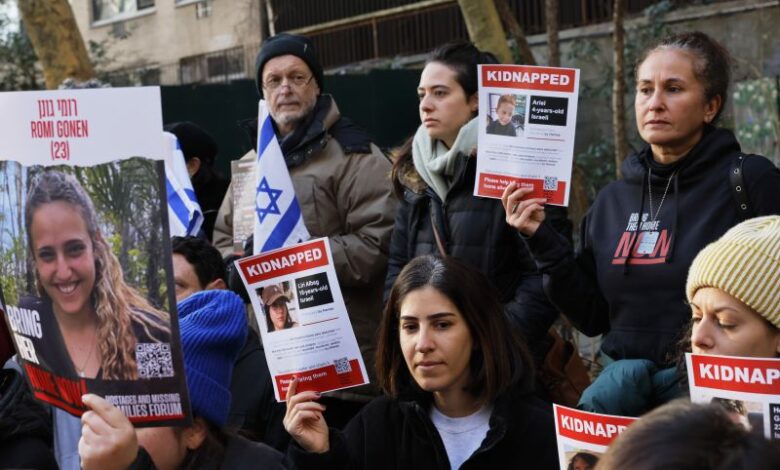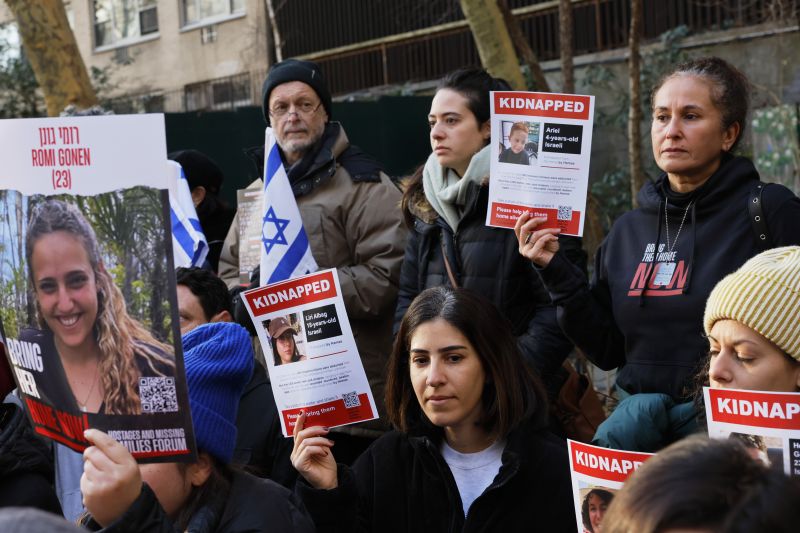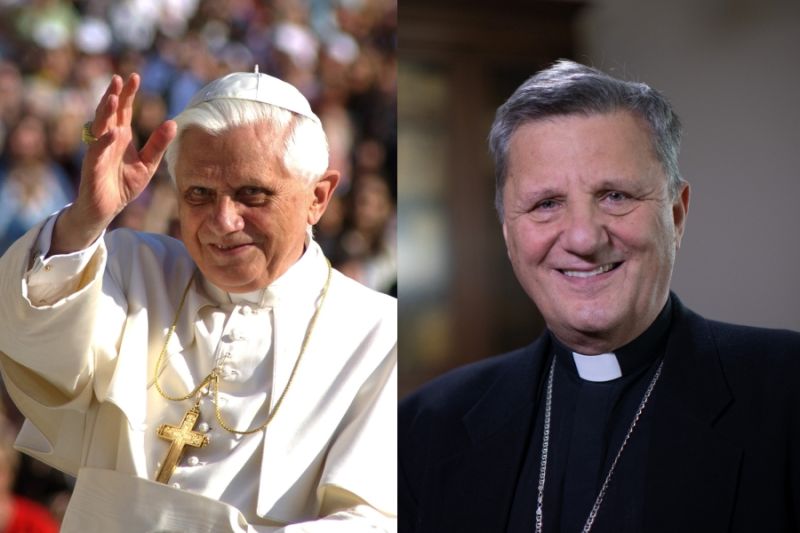Hostages taken in Hamas terror attack approach 100th day in captivity

 People attend a rally for the release of the hostages kidnapped by Hamas at Dag Hammarskjold Plaza near the U.N. headquarters on Jan. 12, 2024, in New York City. / Credit: Michael M. Santiago/Getty Images
People attend a rally for the release of the hostages kidnapped by Hamas at Dag Hammarskjold Plaza near the U.N. headquarters on Jan. 12, 2024, in New York City. / Credit: Michael M. Santiago/Getty Images CNA Staff, Jan 12, 2024 / 14:40 pm (CNA).
As the Israel-Hamas war nears its 100-day mark, well over 100 hostages of the conflict are still estimated to be held in Gaza, with advocates and global groups drawing attention to their plight and calling for their immediate release.
In Israel this week, “corporations, universities, and retail chains” are organizing a major “labor strike” planned for Saturday “in support of the families of the Hamas hostages still being held captive in Gaza,” according to the Times of Israel.
In the United States, a rally was held in midtown Manhattan on Friday in support of the hostages. In attendance were New York Gov. Kathy Hochul and Sen. Chuck Schumer, who called for the release of the captives. Major protests in Israel last week also demanded their release.
The American Jewish Committee (AJC) said this month that while a temporary cease-fire in November “saw 105 civilians released from Hamas captivity,” Israeli forces believe that “over 132 hostages remain, including two children.”
AJC noted that Israel Defense Forces (IDF) recently “confirmed the deaths of 18 hostages due to new intelligence and findings from soldiers in Gaza.”
AJC, which advocates for the protection of civil liberties for Jewish people, said that the terrorist group Hamas “employs various strategies to take Israelis hostage, including cross-border raids and exploiting tunnels to infiltrate Israeli territory from Gaza.” Its large-scale hostage capture during the Oct. 7 raid was “without precedent,” the group said.
“The work to free every hostage — irrespective of age, gender, or nationality — cannot stop,” the AJC said. “The global community must continue efforts to ensure that every single hostage will be reunited with their loved ones and ensure that this humanitarian issue remains at the forefront of all global efforts in the region.”
Hamas terrorist forces on Oct. 7 crossed Israel’s border, murdering civilians and capturing men, women, and children indiscriminately. Photos and videos were shared on social media showing women being taken on motorbikes and in military convoys; missing-person posts quickly circulated with families pleading for the return of infants and toddlers.
Just days after the conflict began, Pope Francis appealed for the immediate release of the hostages being held by Hamas.
Around the same time, the Latin Catholic patriarch of Jerusalem offered to be exchanged for the children being held hostage in the Gaza Strip. And world leaders and international bodies including the United Nations have repeatedly appealed for the release of all hostages in the conflict.
A spokesman with Hamas said this week that ”enemy prisoners will not be returned alive to their families” unless Israel effects “a comprehensive cessation of the aggression against Gaza.”
Prime Minister Benjamin Netanyahu has indicated Israel’s intent to fully eradicate Hamas in the present conflict. “The IDF will immediately use all its strength to destroy Hamas’ capabilities,” he said after the war began.
Whether or not Israel can succeed at that goal while bringing the remaining hostages home remains unclear. International stakeholders, meanwhile, continue to work to resolve the conflict.
Brett McGurk, a top Middle East adviser for President Joe Biden, reportedly met with Qatari Prime Minister Sheikh Mohammed bin Abdulrahman al-Thani earlier this month to discuss in part efforts to secure hostage releases.
The White House has continued to signal its intent to help facilitate the release of hostages.
“We’re not going to stop hoping to try to get all those hostages home,” White House National Security Council spokesman John Kirby said at a press conference earlier this month.
Others are working to ameliorate the plight of the hostages who remain in Gaza. Qatar was this week reportedly “engaged in high-level discussions with Hamas to deliver vital prescription medicines to Israeli hostages” in Gaza, according to the New York Times, while the American Red Cross said this month that it was working to both “secure the release of all remaining hostages” and to gain “urgent, immediate access to all those detained.”
As diplomatic and humanitarian efforts continue, the hostage crisis remains at the forefront of the conflict. At the outset of the war, news related to Israelis taken hostage by Hamas was shared around the world by families of the abducted.
Shortly after the conflict began, Israeli citizen Noam Perry, for one, told reporters that in the initial invasion, her father encountered Hamas fighters in his home and that he was “able to push [them] away, giving my mother precious minutes to hide,” after which he was captured.
In November, Pope Francis met with families of hostage victims and heard family members describe the heartbreaking anguish of knowing their loved ones are being held captive.
“We haven’t seen or heard anything since. It’s been 47 days,” one said at the time. “And I’m alone. Every day I wake up … and I wait a minute or two for the familiar sounds that I’m used to hearing and there’s nothing.”
In December, freed Israeli hostage and mother Yarden Roman-Gat told CBS News of her own experience as a captive, telling the network that she was “watched and seen at all times” and was aware that her captors “could do anything to me.”
“My kidnappers could not help themselves, showing me off as a trophy and showing my face as an object,” she said. “I was not a person.” She was eventually freed during the brief cease-fire.
Earlier this month, former hostage Aviva Siegel told the Knesset’s Caucus for the Hostages that she witnessed the torture of a fellow captive.
“They tortured her next to me,” she said, according to the Times of Israel. “And I witnessed it. I witnessed what happened there. What’s happening there is simply a catastrophe. It can’t go on.”
Family members, meanwhile, have struggled to make contact with captive loved ones in Gaza. The Times of Israel reported this week that relatives were using “powerful loudspeakers to broadcast messages to their loved ones” still being held hostage, calling out in the hopes that they might be heard.
“I hope you hear us Omer, be strong,” one father said. “I know you’re strong, I know your faith keeps you strong. Everyone at home is waiting for you.”
“Romi, my Romi, we miss you terribly, but we are strong,” another woman called out to her daughter, who was reportedly kidnapped at the outset of the conflict. The mother said over the loudspeaker that she was “so sure you would come back the same week.”
“Don’t lose hope,” she called out. “We are turning the world upside down to bring you back.”




